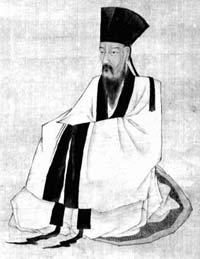Wang Yangming
Appearance
(Redirected from Oyomei)

Wang Shouren (26 October 1472 – 9 January 1529), courtesy name Bo'an, was a Chinese calligrapher, military general, philosopher, politician, and writer during the Ming dynasty. After Zhu Xi, he is commonly regarded as the most important Neo-Confucian thinker, with interpretations of Confucianism that denied the rationalist dualism of the orthodox philosophy of Zhu Xi. Wang was known as Yangming Xiansheng and/or Yangming Zi in literary circles; both mean "Master Yangming".
| This article about a person or group of people is a stub. You can help out with Wikiquote by expanding it! |
Quotes
[edit]- There were contradictions in this philosophy, but these did not disturb its leading opponent, the gentle and peculiar Wang Yang-ming. For Wang was a saint as well as a philosopher; the meditative spirit and habits of Mahayana Buddhism had sunk deeply into his soul. It seemed to him that the great error in Chu Hsi was not one of morals, but one of method; the investigation of things, he felt, should begin not with the examination of the external universe, but, as the Hindus had said, with the far profounder and more revealing world of the inner self.
- Will Durant and Ariel Durant, The Story of Civilization, Book I, Our Oriental Heritage (1935) (3. The Rebirth of Philosophy)
About
[edit]- “I had for many years been a devout believer in Shushi says Nakaye Toju (1608-48), “when, by the mercy of Heaven, the collected works of Oyomei were brought for the first time to Japan. Had it not been for the aid of their teaching, my life would have been empty and barren.”
- Nakaye Toju as quoted in Will Durant, Our oriental Heritage
- In 1795 an edict went forth against the further teaching of the Oyomei philosophy; and so docile was the mind of Japan that from that time on Oyomei concealed itself within the phrases of Confucianism, or entered as a modest component into that military Zen which, by a typical paradox of history, transformed the pacific faith of Buddha into the inspiration of patriotic warriors.
- Will Durant, Our oriental Heritage

